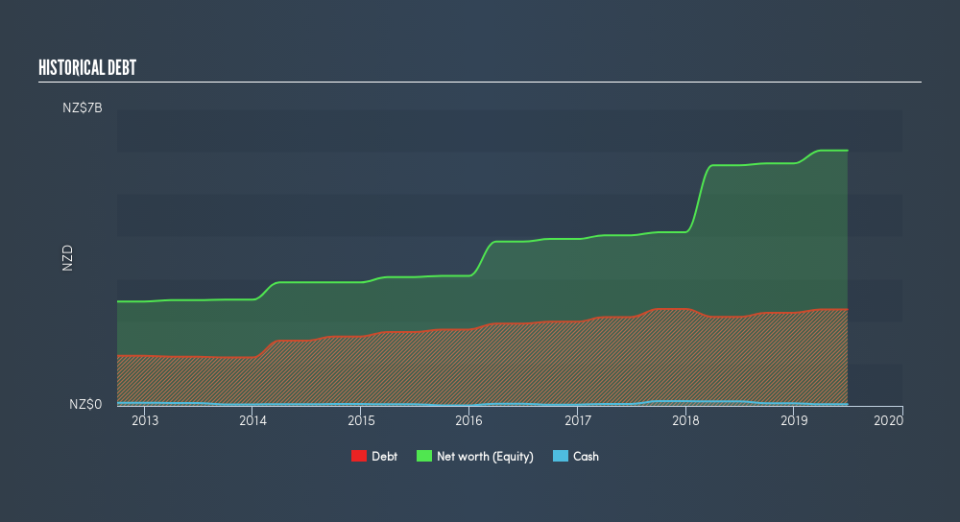Auckland International Airport (NZSE:AIA) Has A Pretty Healthy Balance Sheet

The external fund manager backed by Berkshire Hathaway's Charlie Munger, Li Lu, makes no bones about it when he says 'The biggest investment risk is not the volatility of prices, but whether you will suffer a permanent loss of capital.' So it seems the smart money knows that debt - which is usually involved in bankruptcies - is a very important factor, when you assess how risky a company is. We note that Auckland International Airport Limited (NZSE:AIA) does have debt on its balance sheet. But should shareholders be worried about its use of debt?
Why Does Debt Bring Risk?
Debt assists a business until the business has trouble paying it off, either with new capital or with free cash flow. Part and parcel of capitalism is the process of 'creative destruction' where failed businesses are mercilessly liquidated by their bankers. While that is not too common, we often do see indebted companies permanently diluting shareholders because lenders force them to raise capital at a distressed price. Having said that, the most common situation is where a company manages its debt reasonably well - and to its own advantage. When we examine debt levels, we first consider both cash and debt levels, together.
Check out our latest analysis for Auckland International Airport
How Much Debt Does Auckland International Airport Carry?
The image below, which you can click on for greater detail, shows that at June 2019 Auckland International Airport had debt of NZ$2.28b, up from NZ$2.10b in one year. And it doesn't have much cash, so its net debt is about the same.
How Strong Is Auckland International Airport's Balance Sheet?
The latest balance sheet data shows that Auckland International Airport had liabilities of NZ$560.0m due within a year, and liabilities of NZ$2.10b falling due after that. Offsetting these obligations, it had cash of NZ$37.3m as well as receivables valued at NZ$69.0m due within 12 months. So its liabilities total NZ$2.56b more than the combination of its cash and short-term receivables.
While this might seem like a lot, it is not so bad since Auckland International Airport has a market capitalization of NZ$11.4b, and so it could probably strengthen its balance sheet by raising capital if it needed to. However, it is still worthwhile taking a close look at its ability to pay off debt.
We measure a company's debt load relative to its earnings power by looking at its net debt divided by its earnings before interest, tax, depreciation, and amortization (EBITDA) and by calculating how easily its earnings before interest and tax (EBIT) cover its interest expense (interest cover). Thus we consider debt relative to earnings both with and without depreciation and amortization expenses.
Auckland International Airport's debt is 4.1 times its EBITDA, and its EBIT cover its interest expense 5.8 times over. This suggests that while the debt levels are significant, we'd stop short of calling them problematic. We saw Auckland International Airport grow its EBIT by 8.3% in the last twelve months. That's far from incredible but it is a good thing, when it comes to paying off debt. The balance sheet is clearly the area to focus on when you are analysing debt. But ultimately the future profitability of the business will decide if Auckland International Airport can strengthen its balance sheet over time. So if you want to see what the professionals think, you might find this free report on analyst profit forecasts to be interesting.
Finally, a business needs free cash flow to pay off debt; accounting profits just don't cut it. So it's worth checking how much of that EBIT is backed by free cash flow. In the last three years, Auckland International Airport created free cash flow amounting to 14% of its EBIT, an uninspiring performance. For us, cash conversion that low sparks a little paranoia about is ability to extinguish debt.
Our View
We weren't impressed with Auckland International Airport's conversion of EBIT to free cash flow, and its net debt to EBITDA made us cautious. On the other hand, we found comfort in its relatively strong EBIT growth rate. We would also note that Infrastructure industry companies like Auckland International Airport commonly do use debt without problems. Looking at all this data makes us feel a little cautious about Auckland International Airport's debt levels. While debt does have its upside in higher potential returns, we think shareholders should definitely consider how debt levels might make the stock more risky. Of course, we wouldn't say no to the extra confidence that we'd gain if we knew that Auckland International Airport insiders have been buying shares: if you're on the same wavelength, you can find out if insiders are buying by clicking this link.
If you're interested in investing in businesses that can grow profits without the burden of debt, then check out this free list of growing businesses that have net cash on the balance sheet.
We aim to bring you long-term focused research analysis driven by fundamental data. Note that our analysis may not factor in the latest price-sensitive company announcements or qualitative material.
If you spot an error that warrants correction, please contact the editor at editorial-team@simplywallst.com. This article by Simply Wall St is general in nature. It does not constitute a recommendation to buy or sell any stock, and does not take account of your objectives, or your financial situation. Simply Wall St has no position in the stocks mentioned. Thank you for reading.



